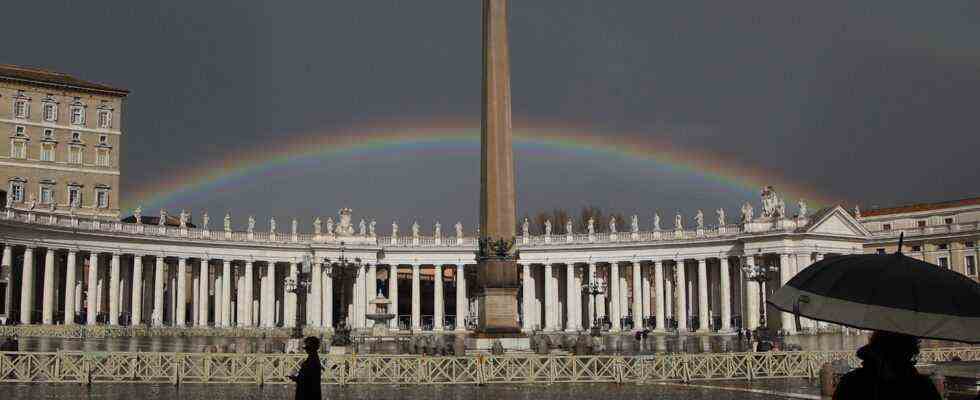Exclusive
Status: 01/24/2022 00:07 a.m
More than 100 non-heterosexual employees of Catholic institutions go public together. They want to draw attention to a discriminatory system.
During the interview at the Catholic welfare association, it is made clear to the applicant that marriage to her wife will be tolerated, but only as long as she doesn’t talk about it too much. A Caritas employee hid her lesbian relationship for decades, a religion teacher hardly dares to go out on the street with his partner. A diocese employee received a termination agreement when she disclosed her civil partnership with a woman.
In an exclusive ARD-Documentation, for the first time 100 queer Catholics report publicly about their experiences in the church and its institutions. At the same time, an association of more than 100 believers goes under the name “Out in Church” to the public to protest against the labor law provisions and a non-transparent system that allows arbitrariness and threats against employees.
A separate labor law for the churches
With around 1.3 million employees, the Protestant and Catholic churches are the second largest employer in Germany after the public sector. Although the General Equal Treatment Act is intended to prevent discrimination on the grounds of religion and sexual identity, many Catholic employees have to fear for their jobs. For the churches in Germany, regulated in the constitution, have an extensive right of self-determination, which includes their own labor law.
Anyone who works for the Catholic Church or Catholic institutions must agree to special provisions in their employment contract that penetrate deeply into the private sphere and prohibit people who are queer, i.e. not heterosexual or cis-gender, from being open about their identity. A same-sex marriage could ultimately lead to termination.
Constant fear for the job
However, church labor law gives personnel managers so much leeway that employees become dependent on individual decision-makers. The fear of being discovered and, in the worst case, losing their job is omnipresent for queer Catholic employees. Many describe in the interviews with the ARD the resulting psychological stress.
In some cases, those affected are apparently put under pressure by their superiors. “It’s often very subtle in the church system,” says community officer and co-initiator of “Out in Church”, Jens Ehebrecht-Zumsande. He remembers a situation in which he did not agree to a transfer and the person responsible replied that in his “special way of life” he should better do what was expected of him, according to Ehebrecht-Zumsande.
Thomas Schüller, Director of the Institute for Canon Law at the Westfälische Wilhelms-Universität Münster, also sees that such experiences are made possible by Catholic labor law. He repeatedly advises employees who come into conflict with church labor law.
As a rule, as long as it doesn’t become public, you tolerate a lot. You know that, you tell people that too, but you say, in our grace and grace, you can continue to work for us. But that’s how you always leave people in an anxious limbo. There is always the possibility that if this becomes known, for example if you get married in a civil registry office, then we could strike if we wanted to.
There is no legal certainty for queer employees in the Catholic Church and its institutions.
Politicians want to talk about reform
In addition, there is a homophobic atmosphere, which is cultivated by the church leadership in the Vatican: Although Pope Francis has also expressed himself with forgiving words about queer people – but in the Catechism, the official compilation of the basic Catholic beliefs, homosexuality with reference to the Bible is still described as a called “bad aberration” and called homosexual people to chastity. In spring 2021, the Vatican banned the blessing of homosexual couples because God does not bless “sin”.
No representative of the clergy from the Vatican was willing to ARD to speak. From the German dioceses, only the Bishop of Aachen, Helmut Derser, gave an interview, despite numerous requests. Regarding hurting queer people, he says: “I apologize on behalf of the Church for the people who have been hurt in their pastoral encounters with the Church, misunderstood, forced to think in terms of a certain position that they themselves cannot accept. ” Bishop This sees a need for reform of labor law, but the German bishops are divided on this point.
In its coalition agreement, the traffic light coalition announced that it would examine with the churches how church labor law could be brought into line with state law. However, the government cannot dictate this to the churches – the church’s right to self-determination is more important. Activities related to proclamation are to be excluded from the reform. The religion teacher will therefore have to keep his relationship secret in the future.

